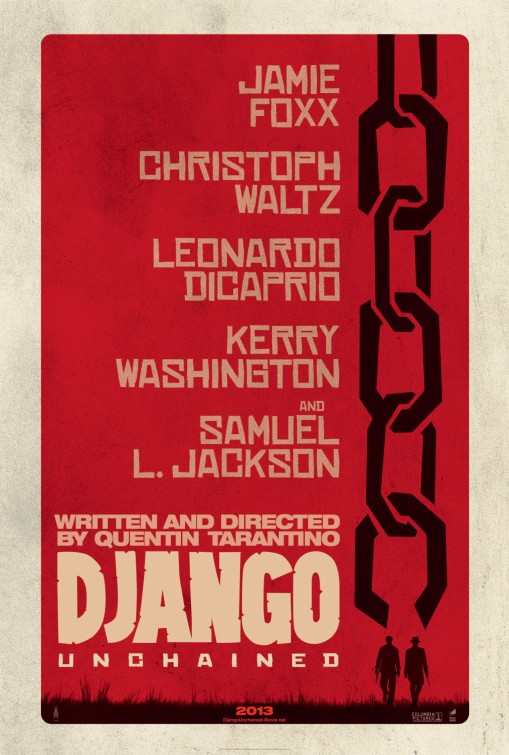
Django Unchained, three hours of the best of Quentin Tarantino mixing the blaxploitation and mediterranean western.
More than Django Unchained, we must talk about Tarantino Unchained. Clearly superior in its results to Inglourious Basterds, the revision of Django, mythical character in the history of european western, allows the director of Reservoir Dogs look full panoply of narrative devices, playing better than ever with this formula film recycling so well that he has paid for his entire career.
In Django Unchained that game with what already exists in the form of pre-wink, never blatant plagiarism, but as always the gall and hooliganism is part of the Tarantino formula, start with original music composed by Luis Bacalov for the original movie directed by Sergio Corbucci in 1966. From there, Tarantino builds various elements and features of the original stories of the mediterranean western, in situations such as characters, dialogue, landscapes and even artistic expression (close-ups or zoom in those key moments, the presentation of the villain incarnate by Di Caprio …). Even shows that understands the mediterranean western as its essential key european western variant of the classic American story incorporating their mix of characters and landscapes of the Far and Wild West with european classical mythology. If the mediterranean western incorporating universal characters and storylines from Greek and Roman mythology, Tarantino does the same but adding the story a Norse legend, that of Brunhilda, daughter of Odin, monitoring rescued from a dragon by the hero. The scene of justification of revenge in flashback or the beating and mistreatment at the hands of the hero of the villains as a prelude to his return redemption by way of revenge, a kind of resurrection ceremony linked to the universal argument returning messiah impose the death for justice, are also two classic elements of mediterranean western Tarantino skillfully incorporates his Django Unchained.
Naturally the director is not only the job of emulation or replica of the key mediterranean western, but that becomes essential raw material for its own tale, adding their own notes and style to the story (such as long sequences of dialogue, the verbiage of his characters, especially the character of recycled dentist bounty hunter played by Waltz, and the counterpoint of those dialogue sequences with bursts of brutal violence copiously irrigated with blood).
In Django Unchained Tarantino is a better balance in the hybridization of the mediterranean western characteristics taken as constant inspiration and their own style as a director-author presenting Inglourious Basterds. In fact, more skillfully exploits and solvency in the direction of Christoph Waltz, who was the great strength of Inglourious Basterds but we can excel further enhancing this facet of rogue chatterbox who becomes the hero’s guide or teacher. The relationship and chemistry between Waltz and Jamie Foxx (Django) is much more interesting than the episodic dialogue sequences with different characters that kept the Jewish Nazi hunter in Inglourious Basterds. Waltz also shines much more in his duel with the great villain interpretive composing Leonardo Di Caprio than he could shine in front of Brad Pitt.
Another common feature of Tarantino films, the sly humor that appears unexpectedly in fragments less predictable and playing with political incorrectness as who gets into a minefield voluntarily is also in Django Unchained. We found for example in his satire on the Ku Klux Klan, a perfect comic timing. As it usually does, then Tarantino comedy built on a mundane item, the bags with the murderers of the lynch mob cover their heads, turning what in everyday and terrifying monsters in both morons. It is a wise way to introduce a dramatic element from humor and overcome fear through laughter. It is regrettable that so clever a maneuver has been misinterpreted like racism. Quite the contrary: Django Unchained not only not racist, but from his treatment of the matter from the point of view of genre and escapist cinema, draw a landscape of racism much more frightening, disturbing and less makeup than we sell , for instance, Steven Spielberg in his Lincoln. The reason is clear: Tarantino descends into hell of racism at the time as Spielberg did with genocide in Schindler’s List, and although it does from a perspective of escapist cinema, the film contains moments so descriptive about slavery and the situation of blacks in America as slaves rope first, introducing flashbacks in the story of the protagonist’s memories, chained black scenes with nooses on the neck, the lashes, the attack dogs, the sequence of the fighters (which organizes the director cleverly playing the most usual counter to such scenes, opting for a fight in a room, instead of riding a great display style street fighting sequences of the first film directed Sherlock Holmes by Guy Ritchie). And along with these elements, a character, played by Samuel L. Jackson, which perfectly reflects the idea of Uncle Tom, the black participant of racism, active figure of the attack against the people of his own race, that both the director and the actor playing the part responsible for getting the most disturbing summarize racism, even with some tasteless jokes (Negrules).
That tone prevailing decadent mansion in Candyland racist accompanies the second part of the film, which is a real trip to a nightmare world. Think that’s trivializing racism is a serious mistake.
Miguel Juan Payán
COMENTA CON TU CUENTA DE FACEBOOK




